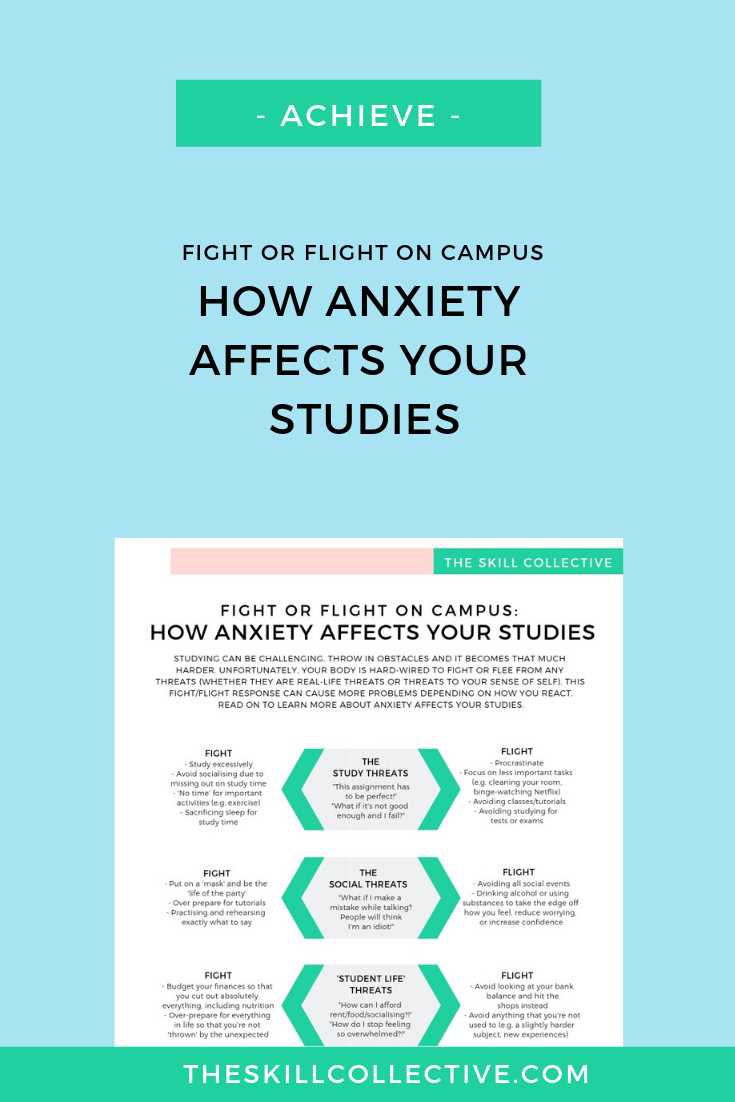Anxiety on Campus: What students need to know about managing anxiety
by Sylvie Seguin
The start of a new academic year at university is a time of fresh starts, hope, and optimism for a good year ahead. Unfortunately, students also face a range of potential stressors –pressure to perform, adjusting to a new environment and new social networks, relationship difficulties, financial strain…it’s no wonder that anxiety and other mental health difficulties are on the rise. Indeed, research out of the US suggests that 1 in 5 college students face anxiety, and closer to home a study of tertiary students indicated that around 80% of students felt their anxiety and/or stress affected their studies.
What is anxiety and how does it affect students?
Anxiety is an evolutionary response that your brain sets off so as to protect you from danger – it’s a Fight or Flight response that helps you get to safety as it quickens your heart rate and breathing rate so that the muscles that you need to get to safety or to protect yourself are working at their peak. At its extreme, anxiety can result in a heightened state of panic.
Question is – what is your brain trying to protect you from on campus? Well, contrary to what some may think, being a student really is a challenging job, with these just being a few pressures students face:
Pressure to perform, potentially to get into highly competitive postgraduate courses
Social anxieties ranging from meeting new people, talking to lecturers and tutors, having to contribute in tutorials, group projects, public speaking, and navigating social media.
Financial strain from finding money to make rent, pay for necessities, and also having enough for social engagements
Identifying a career path and finding employment in your desired field in a competitive market
Looking after yourself (self-care)
Becoming more responsible as you ‘unlock’ the next stage of life…or, adulting!
Juggling relationships (friendships, family, partners)
Balancing it all!
When faced with these challenges, it’s easy to see how anxiety can set in. As part of this reaction, anxiety triggers Fight or Flight responses that negatively impact on your studies. For example:
Feeling anxious about speaking up in class may lead you to either over-prepare a highly rehearsed speech (Fight), or avoid speaking up altogether (Flight)
Feeling anxious about money so spend an excessive amount of time in paid work (Fight), potentially to the detriment of your studies, or to avoid looking at your bank balance and go shopping instead (Flight)
Feeling anxious about your employment prospects and so focus overly on working (Fight) to the detriment of studying, or to hope for the best and tell yourself that grades alone will get you there (Flight).
Grab our tip sheet below to learn about other ways in which the Fight/Flight response affects your studies.
Managing anxiety on campus – what students need to know
Even if you recognise signs of your own Fight/Flight response, all is not lost – the fact you’re aware is the first step! Here are some more tips to help you manage your anxiety better.
1. Set yourself realistic and sustainable goals
Whether your concern is your studies, social situations, your finances…whatever they may be…making progress involves setting realistic goals that move you in the right direction. For example, having a routine where you study for 2 hours each day during the working week may be more convincing that trying to study for 8 hours each day for every single day of your degree.
2. Prioritise self-care and balance
Too often, self-care is the first thing to go when stress increases because “there’s not enough time”. However, it is one of the most important things you can do for your wellbeing – time and time again, sleep, nutrition, and exercise have all been shown to be helpful. So set limits around your work, and protect some time for play (and rest!).
3. Check your thoughts
Thoughts can fuel anxiety, or dampen it down – which direction do your thoughts drive you towards? Self-talk such as “I must pass…my entire future depends on it!” only serves to increase your anxiety, so choose alternative self-talk that decreases your anxiety (e.g. “I can pass this, and I’ll do my utmost to, but I also know plenty of people who have failed one unit and it hasn’t significantly affected their futures – this ONE unit is not the be all and end all.”
4. Talk it out with someone – seek help, and do it sooner rather than later
Anxiety is very common amongst university students, so it’s unlikely that you’re all alone in how you feel. The problem is that stigma can get in the way of getting you back on track early on, and what may end up happening is that anxiety builds to a peak when the pressure is really on – that is, during exams.
So here are our tips:
Speak to someone (me perhaps!) to learn practical skills to help manage anxiety. I love working with tertiary students and have developed extensive practical knowledge of working with them through my 5+ years experience working at a University Counselling Service, and my experience has taught me that there are many science-backed ways that bring real change to students’ lives when it comes to living with anxiety.
Practice your skills regularly… no matter what skills you learn, it’s critical to practice them regularly. Time and time again we see students fall down in spite of knowing what to do…they don’t actually use what they’ve already learnt! When faced with a high stress situation, then, they’re out of practice and too overwhelmed to pick it up quickly.
In short, take action on your anxiety on campus sooner rather than later, and be sure to keep up with practice!
References
[1] Headspace (2017). National tertiary student wellbeing survey 2016. https://headspace.org.au/assets/Uploads/headspace-NUS-Publication-Digital.pdf
[2] Orygen, The National Centre of Excellence in Youth Mental Health (2017). Under the radar: The mental health of Australian university students. Melbourne: Orygen, The National Centre of Excellence in Youth Mental Health. https://www.orygen.org.au/Policy-Advocacy/Policy-Reports/Under-the-radar/Orygen-Under_the_radar_report.aspx?ext=.









Living with social anxiety as a student can be challenging - speaking up in class, group assignments, public speaking, gaining work experience, making friends … the list of social situations is endless. But there’s no need to suffer further…read on to find how to go from surviving to thriving in your studies.